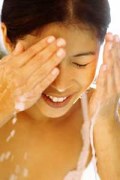The stubborn truth about acne

Ever washed your face more than twice a day to try and clear your skin? Do you avoid take a raincheck on the french fries and chocolate dip in the hopes that it will eradicate those blemishes? What about drinking gallons of water, or exercising more to prevent acne flare-ups?
If you answered yes to any of the above questions, you're not alone.
According to a report from the American Academy of Dermatology, acne is one of the most common skin disorders in the US, affecting almost 85% of us at some time in our lives, usually in the teenage years. More and more acne treatments are coming on to the pharmacy shelves, but there are still countless myths surrounding this stubborn, embarrassing and sometimes debilitating condition.
Speaking at the 63rd Annual Meeting of the American Academy of Dermatology, dermatologist Dr Alexa Boer Kimball of Harvard University discussed a recent survey that determined which acne myths still persist among young adults as well as several studies on the scientific accuracy of these beliefs. "Although new acne treatments are developed every day, a cure for acne has not yet been discovered," he said, "As such, many patients choose to self-treat or experiment with unconventional treatments," he added, "Yet many of these treatments are based on anecdotal observations and have not been rigorously tested by science. The survey indicates that these myths are still affecting how patients care for their acne."
Myth: Poor Hygiene Worsens Acne The relationship between face washing and acne has always been greatly misunderstood, with most individuals believing that dirt and poor hygiene contribute to acne. In fact, a recent survey conducted at Stanford University asked participants about what they thought made acne worsen, and the majority, 91%, mentioned poor hygiene. "If a patient believes that dirty skin causes acne, they logically conclude that washing their face more often will improve their acne," said Boer Kimball. "But dermatologists caution patients against washing too often, as the resulting irritation can exacerbate their acne."
To determine the scientific validity of this myth, the effects of face washing on acne were recently studied at Stanford University. A group of twenty-four males washed their faces twice a day for two weeks using a mild over-the-counter facial cleanser. Then the participants were randomly selected to wash their faces either once, twice or four times a day for another six weeks. The study found that washing the face either once, twice or four times daily did not significantly change the appearance or condition of acne, and determined that the positive effects of increased facial cleansing are minimal at best. Dermatologists continue to recommend washing the face twice daily to maintain good overall skin health.
Myth: Exercise Can Clear Acne or Exercise Can Worsen Acne The relationship between acne and exercise continues to show high levels of individual variability. Some believe that exercise and sweating can help clean out the pores, especially on the chest and back; while others note that their skin worsens when they exercise, especially those who use special equipment that rubs against their skin.
In another study conducted at Stanford University of patients with acne, it was determined that exercise-induced sweat does not have a significant positive or negative influence on acne of the chest and back. Twenty-three male participants were assigned to three groups: no exercise, regular exercise followed by immediate showering and regular exercise followed by delayed showering. The number of acne lesions on the chest and back were counted over a two week period and no difference was noted between the three groups. "Based on the finding of this study, regular exercise can be encouraged for patients with acne," stated Boer Kimball. "But they should avoid tight-fitting clothing and equipment. If tight-fitting equipment is required, it should be cleaned on a regular basis."
Other Acne Myths While misconceptions about facial hygiene and exercise are still the most commonly recognized acne beliefs, the Stanford survey also found that respondents believed that poor diet and decreased sleep can negatively affect acne. In addition, more than 80% of participants believed that increased stress, touching the face and popping pimples exacerbated the condition. Among male and female participants, the only differences noted were that more females believed that increased stress could worsen acne and that drinking more water would improve the quality of their skin. The study also found that some beliefs that were previously popular about acne were no longer viewed as true, including the idea that tanning improves the appearance of acne.
"What this survey and these studies have shown is that substantial differences still exist between popular belief and scientific support, yet this does not change the way patients attempt to care for their acne," stated Boer Kimball. "It is important for anyone who is affected by acne to seek the help of a dermatologist who can diagnose and provide treatment options that are specific to the patient